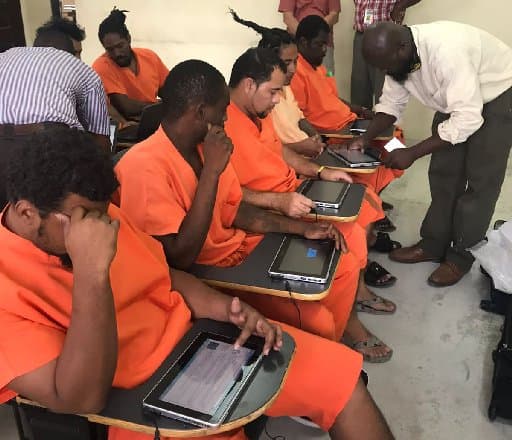BELIZE CITY — Greg Jones has a clear idea when his life changed. It was not in 1998, when he went to prison, or 2007, when he was paroled on a manslaughter charge.
The year that stands out for Jones, which is not his real name, is 2002. That’s the year the Belize Central Prison went from state control to being run by the private Kolbe Foundation.
“You did not want to be in the prison before Kolbe took over. It was horrible. The government put you there to rot and you had to do your best just to survive. In 2002, a miracle happened,” said Jones, 46 and a father of five.
The Central Prison, the only one in Belize, is a different kind of private prison. Unlike privately managed prisons in the United States and elsewhere, it is not about making a profit. Instead, the Catholic Church-inspired Kolbe Foundation is a nonprofit with rehabilitation of inmates at its core.
“Recidivism is the key word when you talk about prison. Our goal is to see the prison empty, unlike the for-profit prisons that see this as a business opportunity. We want to offer inmates the best opportunity to turn around their lives,” said Francis “Cisco” Woods, who runs the Kolbe Foundation that his father started.
The foundation got its start with the advent of this century, when Woods’ family construction company was fixing the highway that runs by the prison. His father, John, decided to pay a visit and was appalled by the conditions. He complained to the government and the prime minister at the time, Said Musa, invited him to do something about it.
The Kolbe Foundation was born. John Woods named the foundation after St. Maximilian Kolbe, a Franciscan priest who died in 1941 in Auschwitz. St. Maximilian Kolbe is the patron saint of prisoners. The inspiration for the prison, however, came from his John Woods’ brother, Maryknoll Father Bill Woods, who was killed in a plane crash in Guatemala in 1976.
The prison has close to 1,100 inmates, including men, women and youth offenders. The foundation runs every aspect of the prison, but with government oversight. Earlier this year, the foundation finalized a new contract with the state, receiving $9 a day per inmate, which covers all the costs, including 250 employees.
The number of inmates has been decreasing for the past four years. Belize has one of the lowest prison occupancies in Latin America and the Caribbean, bettered only by three countries, according to a 2020 study from the Inter-American Development Bank.
Authorities report that the country’s homicide rate, once among the highest in the region, is also on the way down. The homicide rate was 42.55 per 100,000 people in 2012, falling to 29.06 per 100,000 people last year, according to the Belize Crime Observatory. The U.S. State Department’s annual human rights report on Belize does cite some abuse committed by guards at the prison.
Woods said recidivism has fallen substantially, now well below half the 70% rate when the Kolbe Foundation took charge 20 years ago.
He said the prison’s work is contributing to the declining crime and incarcerations rates.
“We are having an impact, but is not simple. The most important thing is to heal their (inmates) hearts, to help them forgive themselves,” said Woods.
“We can teach them skills so that they can survive and make a living when they get out, but if their heart is not healed, if they cannot control their anger, forgive, if they do not have coping skills, they will resort to same thing that brought them here,” he said.
The prison offers an array of work and study options, but Woods said the biggest innovation was incorporating a remote learning system, known as RACHEL, which provides hundreds of options, from basic literacy to advanced courses, using tablets.
“It is a visual learning system, so they learn better than with chalk and talk. The literacy training is the most important, because the whole world changes. It is like removing a big cloud that has been hanging over them,” he said.
Ian Peoples, a Jesuit scholastic from the U.S. Jesuits’ central and southern province, runs a program at the prison. He said inmates “express real desire to change their lives, which is success in itself. Many of these guys face hopelessness and cannot imagine their lives being any different.”
He credits Woods with showing inmates that things can be different. “Cisco uses his resources to bring hope to these guys. He is having a real impact on communities,” said Peoples, who works with youth offenders.
Jones could not agree more. He was originally hired by Woods to work at the prison after he was released and, since then, has worked at a number of Woods’ businesses.
“I can say that I survived because of Kolbe,” he said.














